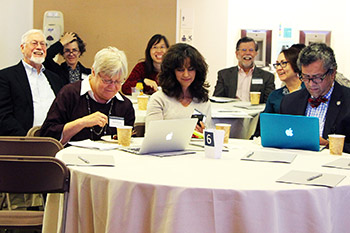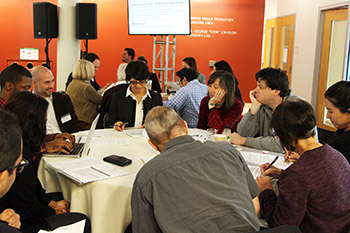Advance-CTR kicked off the first year of Institutional Development Award (IDeA) funding for clinical and translational research at a retreat for stakeholders Saturday at The Warren Alpert Medical School of Brown University.
More than 200 members of Rhode Island’s research community came out for the half-day retreat to learn more about the award mechanism and discuss key areas of need for research support.
Advance-CTR was awarded a $19.5 million, five-year IDeA-CTR program award from the National Institutes of General Medical Sciences in July 2016 to establish clinical and translational research infrastructure in Rhode Island.
Jim Padbury, MD, who serves as Program Director on the award, delivered a keynote address: "We have a tremendous opportunity before us to transform the state of clinical and translational research in Rhode Island.
"It is our mission to help all clinical and translational researchers access the resources and tools you need to collaborate and make discoveries that solve our state's most urgent health priorities."

Faculty and staff from each of Advance-CTR’s academic, hospital and community partners came out to learn more about the award mechanism and engage with other key stakeholders. This included professors and junior faculty from Brown University and the University of Rhode Island, physicians from each of Rhode Island’s major hospital systems (Care New England, Lifespan and the Providence VA Medical Center) and senior VPs from organizations in the community.
Leaders from each of the award’s seven Key Component Activities (KCAs) also had the opportunity to introduce their KCA to the community and discuss their goals and anticipated milestones for the year ahead. The KCAs include three Service activities and two Awards programs.
Chris Schmid, PhD, director of the Biostatistical Consulting and Research Design KCA gave audience members a preview of the “Storefront” of services soon to be available to researchers in the state. It will include study design and preparation support, data analysis and results interpretation, and grant proposal writing, among others.
Sharon Rounds, MD, director of the Pilots Projects Program, detailed the awards program, which is currently reviewing its first pool of applications. The Pilot Projects aim to pair junior investigators from different disciplines and institutions on research projects that address a major health priority in the state, as outlined by the Department of Health.

The retreat also gave stakeholders the opportunity to give feedback about the biggest challenges they face to conducting their research, which include finding other investigators for collaborations, accessing resources and training, and obtaining funding.
Advance-CTR will use the results of the survey as a baseline in its first year as it seeks to address the community’s most pressing needs.
“After years of preparation, we are excited to put greatly needed infrastructure in place for investigators in our community," said Program Coordinator Edward Hawrot, PhD.
"We look forward to learning more about your research needs, and supporting the advances you're already making in translational research."